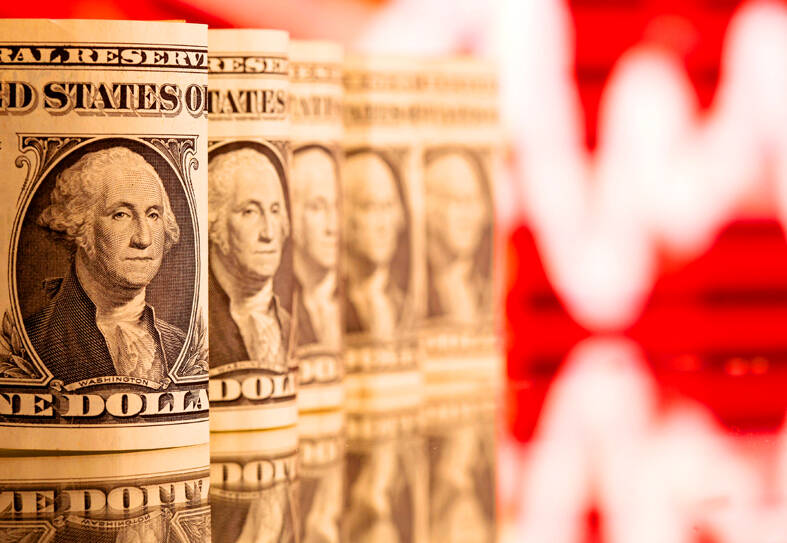The US remained the largest debtor nation to Taiwanese banks for the 38th consecutive quarter as of the end of December last year, the central bank said on Friday.
Taiwanese banks’ exposure to the US totaled US$176.997 billion, a 2.74 percent decline from the previous quarter, central bank data showed.
The decrease reflects growing caution among businesses amid global economic uncertainties, leading to slower investment and borrowing, Department of Financial Inspection Deputy Director-General Hsieh Jen-chun (謝人俊) said.

Photo: Reuters
In addition, a wave of redemptions by Taiwanese investors in US mutual funds contributed to the reduction in US exposure, Hsieh said.
The US accounted for 29.53 percent of Taiwanese banks’ total international claims at the end of December last year, compared with 29.81 percent at the end of September in the same year, he said.
China remained the second-largest debtor nation to the local banking system, with exposure at US$46.94 billion, a 2.75 percent decrease from the previous quarter.
After the US and China, Luxembourg ranked third with exposure from Taiwanese banks at US$44.20 billion, a 0.92 percent decrease from the previous quarter, followed by Australia (US$37.86 billion, down 5.79 percent) and Japan (US$34.50 billion, down 2.84 percent).
Rounding out the top 10 debtor economies were Hong Kong with exposure of about US$31.82 billion (down 1.15 percent from the previous quarter), followed by the UK (US$20.08 billion, down 2.34 percent), Singapore (US$17.80 billion, up 0.10 percent), South Korea (US$17.13 billion, down 0.76 percent) and France (US$15.83 billion, down 0.95 percent).
Combined exposure to the top 10 debtor nations totaled US$443.2 billion, accounting for 73.93 percent of Taiwanese banks’ total international claims as of the end of December last year, the central bank said.
Overall, Taiwanese banks’ international claims — comprising loans, investments, deposits and other holdings on a direct risk basis — dropped US$11 billion from the previous quarter to US$599.4 billion, ending a four-quarter streak of increases, central bank data showed.
Hsieh said the decline in aggregate exposure was due to a decrease in interbank lending and the depreciation of non-US dollar currencies against the greenback.
In the final quarter of last year, the won, Australian dollar, yen, euro and yuan weakened 10.85 percent, 10.22 percent, 8.87 percent, 6.81 percent and 3.88 percent respectively against the US dollar, he said.

‘SWASTICAR’: Tesla CEO Elon Musk’s close association with Donald Trump has prompted opponents to brand him a ‘Nazi’ and resulted in a dramatic drop in sales Demonstrators descended on Tesla Inc dealerships across the US, and in Europe and Canada on Saturday to protest company chief Elon Musk, who has amassed extraordinary power as a top adviser to US President Donald Trump. Waving signs with messages such as “Musk is stealing our money” and “Reclaim our country,” the protests largely took place peacefully following fiery episodes of vandalism on Tesla vehicles, dealerships and other facilities in recent weeks that US officials have denounced as terrorism. Hundreds rallied on Saturday outside the Tesla dealership in Manhattan. Some blasted Musk, the world’s richest man, while others demanded the shuttering of his

ADVERSARIES: The new list includes 11 entities in China and one in Taiwan, which is a local branch of Chinese cloud computing firm Inspur Group The US added dozens of entities to a trade blacklist on Tuesday, the US Department of Commerce said, in part to disrupt Beijing’s artificial intelligence (AI) and advanced computing capabilities. The action affects 80 entities from countries including China, the United Arab Emirates and Iran, with the commerce department citing their “activities contrary to US national security and foreign policy.” Those added to the “entity list” are restricted from obtaining US items and technologies without government authorization. “We will not allow adversaries to exploit American technology to bolster their own militaries and threaten American lives,” US Secretary of Commerce Howard Lutnick said. The entities

Minister of Finance Chuang Tsui-yun (莊翠雲) yesterday told lawmakers that she “would not speculate,” but a “response plan” has been prepared in case Taiwan is targeted by US President Donald Trump’s reciprocal tariffs, which are to be announced on Wednesday next week. The Trump administration, including US Secretary of the Treasury Scott Bessent, has said that much of the proposed reciprocal tariffs would focus on the 15 countries that have the highest trade surpluses with the US. Bessent has referred to those countries as the “dirty 15,” but has not named them. Last year, Taiwan’s US$73.9 billion trade surplus with the US

Prices of gasoline and diesel products at domestic gas stations are to fall NT$0.2 and NT$0.1 per liter respectively this week, even though international crude oil prices rose last week, CPC Corp, Taiwan (台灣中油) and Formosa Petrochemical Corp (台塑石化) said yesterday. International crude oil prices continued rising last week, as the US Energy Information Administration reported a larger-than-expected drop in US commercial crude oil inventories, CPC said in a statement. Based on the company’s floating oil price formula, the cost of crude oil rose 2.38 percent last week from a week earlier, it said. News that US President Donald Trump plans a “secondary